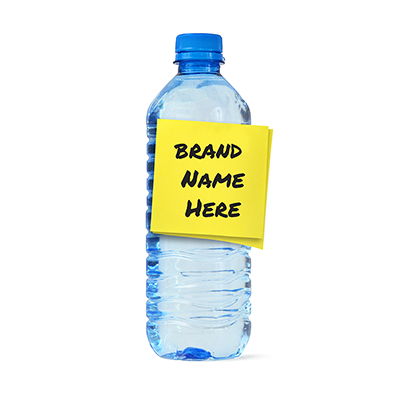What Is
Branding?
Unsure about the meaning of “branding”? Don’t worry! Branding is one of those marketing concepts that even branding companies themselves find it vague and at times confusing. Let’s start by defining ‘Product,’ followed by ‘Branding.’
Product
Product: “Broadly, a product is anything that can be offered to a market to satisfy a want or need, including physical goods, services, experiences, events, persons, places, properties, organizations, information, and ideas” (Kotler & Keller, 2015).



“This means that a product can be anything from a hotel stay, a language course, to clothes, food, etc.”
To illustrate the definition of a product and the role it occupies in defining branding, we will use the example of water:
Water is a free resource that every human being needs to live and survive. Yet it became a product the day humans and companies started to commercialize it by selling mineral water in glass and plastic bottles.
But water always looks the same, doesn’t it? It is liquid and transparent. So, how can different companies sell the same product but still convince people to purchase their bottled water instead of the one from the competition?
The answer is: by creating a “brand.” (The Branding Journal)
Brand
Brand: “A brand is a name, term, design, symbol, or any other feature that identifies one seller’s good or service as distinct from those of other sellers” (American Marketing Association).



“You can consider a brand as the idea or image people have in mind when thinking about specific products of a company, both in a practical (e.g. “the shoe is light-weight”) and emotional way (e.g. “the shoe makes me feel powerful”). It is therefore not just the physical features that create a brand but also the feelings that consumers develop towards the company’s product. This combination of physical and emotional cues is triggered when exposed to the name, the logo, the visual identity, or even the message communicated.
A product can be easily copied by other players in a market, but a brand will always be unique. For example, Pepsi and Coca-Cola taste very similar. However, for some reason, some people feel more connected to Coca-Cola, others to Pepsi.
Let’s illustrate this again with our water example. The product sold is water. But, in order to convince people to purchase a particular water, companies developed different water brands, such as [Hawaiian Springs], Perrier, Fiji. And each one of these brands provides a different meaning to the product water. Hawaiian Springs is untouched, clean. In comparison, Perrier is refreshing, bubbling and sexy. Fiji Water is pure, healthy and natural…and so on.
In the end, a brand is a person’s gut feeling about a specific product or company. Each person creates his or her own version of it, and some brands increase or decrease in popularity because of how consumers feel about them.
Branding is the process of giving a meaning to specific products by creating and shaping a brand in consumers’ minds. It is a strategy designed by a branding agency or the company itself to help people to quickly identify their products and organization, and give them a reason to choose their products over the competition’s, by clarifying what this particular brand is and is not.
Objective
The objective is to attract and retain customers by delivering a product that aligns with what the brand promises. How can it be done?
Branding companies tend to use different tools to create and shape a brand. For example, you can achieve branding through:
- advertising and communications
- product and packaging design
- in-store experience
- pricing
- sponsoring and partnerships
- the visual identity of the brand (logo, website, and colors, are just some examples).
In very simple words, a product is what you sell, a brand is the perceived image of the product you sell, and branding is the strategy to create that image.” (The Branding Journal)
Sources: The Branding Journal, Kotler & Keller: Marketing Management (2015), American Marketing Association (AMA)

A Branding Company
That Implements These Strategies
Still confused? Don’t worry! +COLAB is a branding agency that will implement the five strategies to create a positive image for your company and products. We will implement the right mix of different platforms to help grow your business. As a branding agency, we understand the importance of transparent and consistent communication to effectively build and implement your brand.
